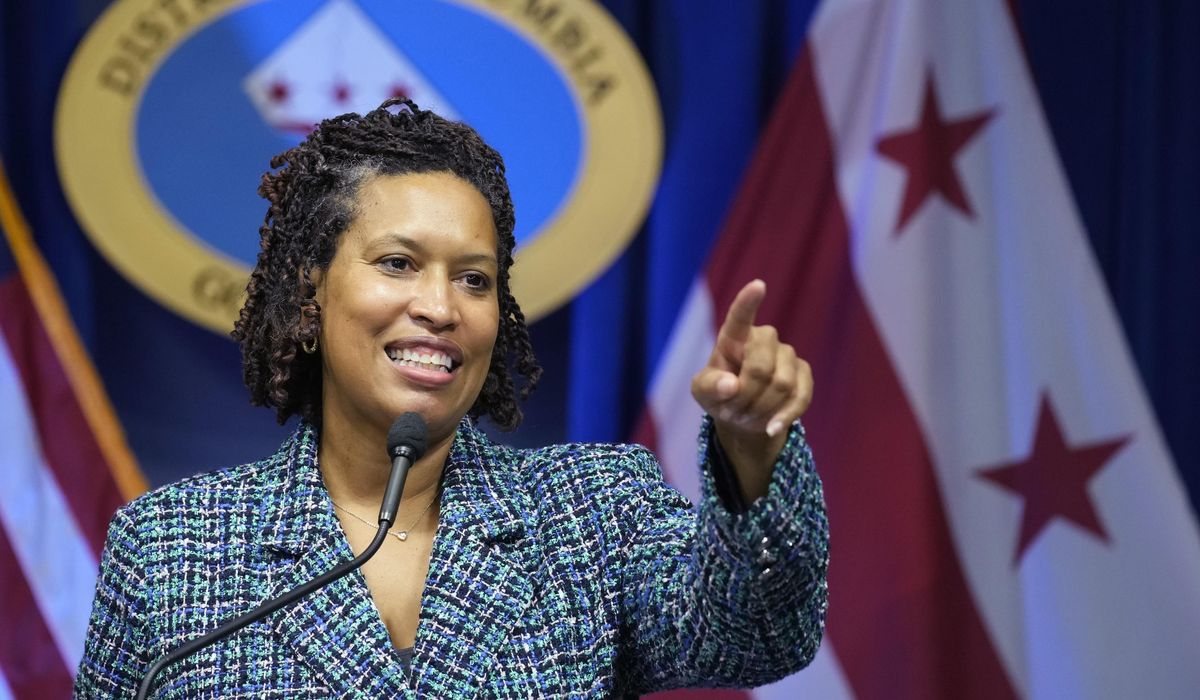


The D.C. Council passed a reparations bill this week that would compensate Black Washingtonians who are descendants of slaves or have been affected by Jim Crow-era policies, but Mayor Muriel Bowser didn’t answer questions Thursday about whether she supports or opposes the legislation.
Ms. Bowser, speaking at a press event for the new Capital One Arena renovation project, said she won’t commit to the legislation that calls for studying how to potentially repay “eligible African Americans” until she takes a look at it.
The proposal would make the nation’s capital the latest U.S. city to join a movement that has captivated race activists and left-leaning state legislatures while mystifying taxpayers.
The reparations movement in the U.S. has resulted in formal apologies but no direct payments to Black Americans.
The D.C. Council passed the measure unanimously this week — and quietly, without any discussion from the 13-member body — amid several bills lawmakers moved through before a two-week recess for Christmas and New Year’s Day.
Councilmember Kenyan McDuffie, the at-large independent who introduced the bill, told The Washington Times he didn’t have time to talk about his proposal as he left the same media event attended by the mayor downtown.
If signed into law, the measure would establish a commission to study the District’s history with slavery and other discriminatory policies that affected Black Americans in the nation’s capital.
The commission would then develop reparation proposals for African-Americans and set up a fund to be used for future payments.
Reparations would be funded by a combination of government appropriations and private donations, according to the bill, but the proposal does suggest that reparations can be a payment of some kind “or other forms of redress.”
A 15-page report on the bill, which was released last month, commended that flexibility because it “demonstrates the profound understanding that the District’s reparation efforts must operate within the context of existing systemic racism to truly make progress toward racial equity.”
Any reparations proposal would have to be approved by a Republican-controlled Congress set to take over Capitol Hill.
GOP lawmakers have used the federal body’s authority over the District to quash some of the city’s left-wing laws in the past. Most notable was when Republicans led the way last year in thwarting a major rewrite of the D.C. criminal code that was seen as too forgiving of violent offenders.
An unpredictable political landscape brought on by President-elect Donald Trump is already interfering with some of the District’s wish list items.
Billionaire tech magnate Elon Musk, a close friend of Mr. Trump and a head of a new commission to cut waste in the federal government, singled out the RFK Stadium site proposal in a federal spending bill amid a torrent of X posts that criticized “pork” in the 1,500-page resolution.
Ms. Bowser shot back Thursday by pointing out the RFK site proposal doesn’t involve any federal dollars, but hands over control of the sprawling campus to the District.
A bill that openly calls for reparations could expect to see a similar amount of attention, if not more, from the president-elect and his advisers.
That may be why the final legislation has an obscure moniker.
The measure was introduced as the “Reparations Foundation Fund and Task Force Establishment Act of 2023.”
It has since been renamed to the “Insurance Database Amendment Act of 2024.”
Enthusiasm for reparations sprang to life nationwide after Minneapolis police officers were found guilty in the 2020 police custody killing of George Floyd, a Black man.
But the initial burst of energy has tapered off as bold proposals were met with tepid responses from political leaders.
California has been the most concrete with its efforts by allocating $12 million in its current budget for “reparations bills.”
However, the state has not approved direct cash payments to Black Californians, despite a 2023 report that recommended reparations of up to $1.2 million to eligible residents.
Gov. Gavin Newsom, a Democrat, signed a formal apology in the fall for the state’s role in “permitting the institution of slavery,” but vetoed two reparations-affiliated bills that came to his desk.
Most significant was a measure allowing Black families to file legal claims if they believe the government took their property through a racially motivated use of eminent domain. The veto rankled ardent supporters of the movement.
“The decision is yet another example of political leaders paying lip service to reparative justice while cowering in the face of true reparative action,” the Coalition for a Just and Equitable California said in a statement to CalMatters.
San Francisco, often viewed as a bastion of liberal governance, folded its reparations committee this year after Mayor London Breed cut funding for the group to save money.
The committee’s report was celebrated on the left for its specific recommendations: $5 million payouts to eligible Black adults, eliminating personal debts and tax burdens, and letting families buy homes in the city for just $1.
But the committee dissolved in January, and Ms. Breed, a Democrat, said cash-based reparations should be handled at the federal level.
The challenge in turning reparations proposals into policy may be best evidenced by the success stories highlighted by the District.
A Racial Equity Impact Assessment published last year said Evanston, Illinois, and Providence, Rhode Island, are examples of how reparations can be given financially without direct cash payments.
In Evanston, the city awards $25,000 grants to certain Black residents, or their descendants, so they can use the money on property costs or home repairs. Roughly 15% of Evanston’s population is Black.
In Providence, the city used leftover federal funds from COVID-19 relief packages toward reparations-like policies.
Money is going to programs that are often used by Black residents, but the funds themselves have to be race-neutral to avoid lawsuits. About 13% of Providence’s population is Black.
• Matt Delaney can be reached at mdelaney@washingtontimes.com.
